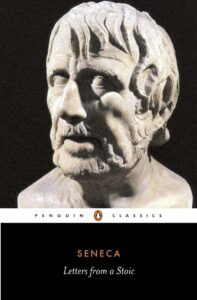The Book in 3 Points
- Stoicism has been around since 300 BC, with many people adopting it across the globe, most prominently the Romans, going forward.
- Don’t waste time on anger, grief, jealousy, fear of death, fear of discomfort, or fear of criticism.
- Build up your fellow humans, family, friends, and country.
Should You Read It?
The book relays the points of stoicism nicely, however, mainly rewriting of original concepts. You are better off reading the source materials from Seneca, Marcus Aurelius, and Epictetus. He is a good writer and relays the essential points nicely. However, in relation to the modern day, which isn’t done (obviously) in the 2000-year-old source materials. If you want a general intro into stoicism from a history teacher, this is a good book to read. However, if you want to simply learn the points on how to improve your life from stoicism, skip this book. The book is less instructional and more of a history book. Checkout out Meditations from Marcus Aurelius instead.
Major Take-Aways
- Zeno was the first stoic around 300 BC.
- Humans were designed to do certain things. It is our duty to stay in this natural way. We are intended to be social creatures, have duties to our fellow man, honor our parents, be agreeable t our friends, and be concerned with the interests of our countrymen.
- No matter how hard we try, bad things will happen sometimes.
- Don’t think bad things are going to happen, but think that they likely could happen, even tomorrow or now, does that change how you think?
- Goals should be mostly internal goals.
- The past is fate. The present is fate. The future is not fate.
- Awesome story: Cato was struck by a random person in the baths. When the person realized it was the important guy Cato he apologized. Instead of getting angry, Cato simply replied, “I don’t remember being struck” Cato shows a finer spirit by not acknowledging the blow than he would have by pardoning it. Refusing to respond to an insult is, paradoxically, one of the most effective responses possible.
- Another story, generally not needing wealth, is more valuable than wealth itself, Epictetus argued. Musonius was conned into giving a “fake philosopher” money and then later told the person was a conn-man and not a good person. Rather than taking the money back, Musonious let him keep it, saying, with a smile, that if he was, in fact, a bad person, he deserved the money.
- The only person who can ruin your life is you.
Helpful Quotes
- Epictetus, “Misfortune weights most heavily on those who expect nothing but good fortune.”
- A stoic will pause in his enjoyment of life to think about how all these, all these things he enjoys, could be taken from him.
- We cannot avoid dealing with annoying people, even though doing so would make our life easier. Nor can we capitulate to these annoying people to avoid discord. Instead, Marcus declares, we should confront them and work for the common welfare. Indeed, we should “show true love” to the people with whom destiny has surrounded us.
- In the same way that a mother would be foolish to let the “insults” of her toddler upset her, we would be foolish to let the insults of these childish adults upset us.
- Being angry, Seneca concludes, is a waste of precious time.
- Musonius goes on to suggest that we would also be better off, instead of working hard to become wealthy, we trained ourselves to be satisfied with what we have; if, instead of seeking fame, we overcame our craving for the admiration of others; if, instead of spending time scheming to harm someone we envy, we spent that time overcoming our feeling of envy; and if, instead of knocking ourselves out trying to become popular, we worked to maintain and improve our relationships with those who we knew to be true friends.
- What stands between most of us and happiness is not our government or the society in which we live but defects in our philosophy of life or our failing to have a philosophy at all.




